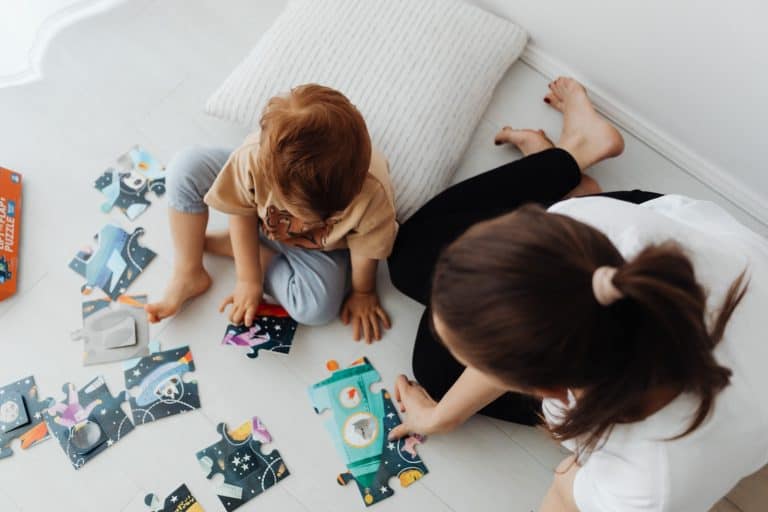Jigsaw puzzles, as educational tools, have a long-standing charm that transcends generations, captivating adults and children alike. Few pastimes offer such rich rewards for the time and effort invested. Jigsaw puzzles are not just a popular pastime but are proven impactful educational tools that promise fun while simultaneously enhancing numerous cognitive skills.
Making the first jigsaw puzzle dates back to around 1760 when John Spilsbury, an English mapmaker, mounted a map on a wood piece and then painstakingly cut around the boundaries of each nation. These dissected maps, as they were initially known, served primarily to teach children geography. Today, the availability of puzzles has diversified, ranging from simple shapes for toddlers to intricate and challenging puzzles for older adults.
Cognitive Benefits of Jigsaw Puzzles as Educational Tools

Solving jigsaw puzzles does more than provide entertainment. It stimulates the brain, hones problem-solving skills, and supports the development of fine motor skills. Jigsaw puzzles offer opportunities for us to use our brains while enabling learning in a fun, accessible way.
Spatial Reasoning and Memory
Each puzzle piece corresponds to a specific slot, a methodology that encourages hand-eye coordination and spatial reasoning. Remembering the shapes, shades, and subtle nuances of different pieces also helps improve memory.
Problem-Solving Skills
Every jigsaw puzzle confronts you with a problem to solve: how to convert hundreds or thousands of small pieces into a complete image. With every piece put in place, your problem-solving skills strengthen and expand.
Socialization and Collaboration
Jigsaw puzzles aren’t just for solo fun. They can be an excellent social tool, encouraging cooperative play and boosting social skills. Whether during indoor recess or free time, children can enjoy working together to solve puzzles, fostering cooperation and teamwork.
The Practical Uses of Jigsaw Puzzles in Education
Jigsaw puzzles serve as an excellent educational tool, helping teachers impart complex concepts more comfortably. From geography and history to mathematics and languages, puzzles can breathe life into any lesson.
Early Childhood Education

In early childhood education, jigsaw puzzles promote hand-eye coordination, attention to detail, and focus. This puzzle-making fun activity helps children develop important motor skills.
Special Education
Puzzles are often used in special education settings, as they provide a tactile tool to help students understand various concepts better while improving their motor skills.
Teaching Complex Subjects
Teachers utilize jigsaw puzzles to teach complex subjects such as world geography. Puzzles with dissected maps provide a hands-on approach to learning world countries and continents.
Cultivating Emotional Skills through Jigsaw Puzzles
Solving jigsaw puzzles can be much more than a fun game; it can act as a source of tranquility and satisfaction. It is an exercise that can help foster emotional skills in both children and adults.
- Managing Stress: During the challenging times we live amidst, people are reaching out to traditional hobbies to relieve stress and relax. Initiating a jigsaw puzzle and progressively getting absorbed into the process can be therapeutic. The satisfaction of fitting the final pieces and seeing the complete picture gradually unfold can offer an unparalleled sense of achievement.
- Building Self-Esteem: The journey of jigsaw puzzle-solving, from the first to the last piece, can serve as a confidence booster. Both children and adults can benefit from the increased self-esteem that comes from solving a difficult puzzle, learning a new strategy, or simply improving their speed.
Selecting the Right Jigsaw Puzzle as an Educational Tool
When choosing a puzzle, consider the age, interests, and educational goals of the students. Simple puzzles with large pieces are suitable for younger children as they are less intricate and help improve hand-eye coordination. On the other hand, challenging puzzles with several small pieces will engage older students and adults, stimulating problem-solving skills and potentially sparking interest in various fields.
Incorporating Jigsaw Puzzles into Lessons
The integration of jigsaw puzzles into the classroom can be a creative and engaging way to implement active learning. Here’s how educators can include this effective educational tool in lesson planning.

- Group Activities: Teachers can incorporate jigsaw puzzles into group activities, which are suitable for teaching new topics or reinforcing ones already learned. Jigsaw puzzles can provide an interactive learning ground where students can socialize, collaborate, and acquire problem-solving skills.
- Rotating Puzzle Stations: Creating rotating puzzle stations with different themes relevant to the lesson can also be effective. It caters to individual learning paces and allows learners to engage with multiple topics. Incorporating this method can be especially effective when teaching subjects such as geography and history.
Success Stories: Jigsaw Puzzles in the Classroom
There has been a resurgence in the use of jigsaw puzzles as educational tools in recent years. Teachers report improved memory retention, increased engagement levels, and enhanced spatial reasoning among students who partake in regular jigsaw puzzle activities. Parents also see a significant improvement in their children’s problem-solving skills, demonstrating the relevance of puzzles as an impactful learning tool at home as well.
Final Thoughts: Using Jigsaw Puzzles as Educational Tools
Next time your students are looking for something to do, consider presenting them with a jigsaw puzzle. It’s not just a fun way to pass the time but a powerful educational tool that can benefit learners of all ages. The historical trajectory of jigsaw puzzles, their cognitive benefits, and their remarkable usefulness as learning aids for various subjects can’t be underestimated.
So whether you’re a parent hoping to entertain your children during free time or a teacher seeking creative lesson ideas, remember – never underestimate the power of a puzzle.

